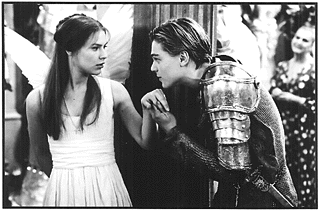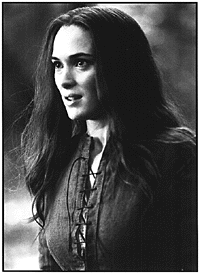Invasion of the Lit Flix
Literary Classics Rush the Screen
By Marjorie Baumgarten, Fri., Nov. 8, 1996
Sure, invasions like this happen every autumn as the summer's no-sweat film amusements melt into oblivion. Yes, it was fun to see those cows fly by in Twister and to watch our stand-ins protect the American way of life from alien takeover in Independence Day. But sure as the earth continues to rotate around the sun and one season assuredly begets another, the summer's movie escapism gravitates into the serious-mindedness of fall.
Perhaps it's just a part of our conditioned American lifestyle that triggers that sensible inner voice that chides at the end of every summer: "Back to school. Back to school." It's the voice that reminds us that recess is over and it's once again time to hit the books.
The Hollywood distribution system has long helped to solidify this national biorhythm by deeming summer to be the exclusive domain of genial, undemanding fare -- the silver screen equivalent of lightweight beach books. But as the days grow increasingly shorter and colder, and the race toward the Oscar finish line pares down into a high-visibility sprint, Hollywood rolls out its "quality" material. It's even ordained in the official rulebook: Never wear white after Labor Day; never release a Shakespeare film before Labor Day.
This notion that thought-provoking, high-minded material is best reserved for the winter months has proven resilient, even though some arthouse distributors during recent summer months have chipped away at the catechism by daring to release some decidedly non-fluff items that went on to achieve successful box-office numbers. Of course, there are also the exceptions that prove the rule, such as this summer's disappointing release of Moll Flanders and the animated Hunchback of Notre Dame.
 Nicole Kidman in The Portrait of a Lady |
As we enter the new winter film season, the outlook is predictably familiar. It's time to trade in our Stripteases and Nutty Professors for corsets and iambic pentameter. What's different about the season ahead is not the kind of material being offered. What's different this year is the number of high-art films being presented. Depending on how you count such things, there are anywhere from six to twelve film adaptations of certifiable literary classics scheduled to open during the next couple of months.
William Shakespeare leads the pack with at least five film treatments on tap of his Elizabethan-era plays. Moreover, these come on the heels of 1995's Othello starring Laurence Fishburne and Kenneth Branagh; the extremely inventive Richard III with Ian McKellan, which recast Shakespeare's most notorious villain as a fascist in 1930s England; and Branagh's comical A Midwinter's Tale, in which an amateur theatre troupe mounts a production of Hamlet. Taking little heed of the farcical disasters that befell his volunteer thespians in A Midwinter's Tale, Branagh is due to release on Christmas Day his new four-hour-long (including intermission) film version of Hamlet with a cast that includes Julie Christie, Gerard Depardieu, Rosemary Harris, Charlton Heston, Derek Jacobi, Jack Lemmon, Robin Williams, Billy Crystal, and Kate Winslet. As both an actor and a director, Branagh has shown himself to be one of Shakespeare's most loyal film boosters. His 1993 rendition of Much Ado About Nothing became the most prosperous Shakespeare film released in the last 20 years, and also broke the traditional release-pattern laws by debuting during the summer of that year.
Currently playing in Austin are William Shakespeare's Romeo & Juliet and Looking for Richard. Each boldly uses the medium of filmmaking as a tool for uncovering aspects of the plays, Romeo and Juliet and Richard III respectively, heretofore unseen. Neither film is a recording of a standard stage performance. Each film wants to find ways to share the immortal texts with new audiences and to take advantage of 20th-century technology and aesthetics to elucidate their mysteries. In Baz Luhrmann's opulent updating of the Romeo and Juliet saga to the imaginary town of Verona Beach, Florida, the director appropriates iconography, artifacts, and sounds from every corner of modern life and uses them to bombard the senses with such overwhelming stimuli that the authentically spoken (albeit with American accents) Shakespearean dialogue is experienced as one further aural cascade of pleasure. Al Pacino, on the other hand, uses Looking for Richard as a sketchbook for sharing with an audience some of his own passion for the character of the inscrutably villainous Richard III. His approach is informal; he wants to find the modern obstacles that derail our appreciation and understanding of the Bard. Both projects create universes that can exist only within the realm of the movies; both films use the trappings of the 20th century to tell their oft-told stories in unique and original fashions.
Also due this season is a version of Shakespeare's comedy Twelfth Night directed by Trevor Nunn, the renowned former director of the Royal Shakespeare Company and current head of England's Royal National Theatre. The complex plot full of mistaken identities becomes a meditation on desire and disguise and stars Helena Bonham Carter, Richard E. Grant, Nigel Hawthorne, and Ben Kingsley. Using a print ad campaign that quotes Stephen Holden's New York Times review describing the film "a gleeful cross-dressing romp" and theatrical trailers set to the music of the Village People, it's clear that Twelfth Night's distributors hope to boost its Lit Crowd market share with some crossover customers.
 Claire Danes and Leonardo DiCaprio in Romeo and Juliet |
Moving on from Shakespeare, we find another rung of authors who have as yet to acquire as many generations of readership as the Bard, but would be on anyone's short list of great English novelists of the last century. Jane Campion's much-anticipated rendition of Henry James' The Portrait of a Lady stars Nicole Kidman as the story's independent woman of the 1870s. Campion's follow-up to her widely praised The Piano seems to again match the director with another headstrong heroine as well as the lush camerawork of Piano collaborator Stuart Dryburgh. The movie also co-stars John Malkovich, Barbara Hershey, Mary-Louise Parker, Martin Donovan, Shelley Winters, Richard E. Grant, and Shelley Duvall.
In Jude, director Michael Winterbottom brings Thomas Hardy's bleak tale of doomed love, Jude the Obscure, to the screen. Hardy's harsh final novel seems fitting subject matter for the director of the profoundly disturbing Butterfly Kiss and stars Shallow Grave's Christopher Eccleston and Sense and Sensibility's Kate Winslet (who is emerging as one of the most pervasive actresses in the Lit Flick arena). Not to be left out is the other great turn-of-the-century novelist Joseph Conrad. Carrington's director Christopher Hampton has adapted Conrad's The Secret Agent for the screen starring Bob Hoskins, Patricia Arquette, Gerard Depardieu, and Jim Broadbent. Set in Victorian London, Hoskins plays an agent provocateur who works for the police and a foreign power while at the same time ostensibly a member of a Soho anarchist group whom he must betray. Reportedly, the novel is cited in one of the Unabomber's screeds as one of his favorites, which adds a touch of unforeseen topicality to this literary classic.
 Winona Ryder in The Crucible |
Truman Capote's coming-of-age novel The Grass Harp has been adapted for the screen by scriptwriters Stirling Silliphant and Kirk Ellis. Charles Matthau directs his father and a fine ensemble cast that includes Jack Lemmon, Sissy Spacek, Piper Laurie, and Nell Carter. In Kurt Vonnegut's Mother Night, an American spy poses as a Nazi sympathizer in World War II Germany and, in typically absurdist Vonnegut fashion, eventually loses track of his real identity. It stars Nick Nolte, Sheryl Lee, Alan Arkin, and John Goodman.
It remains to be seen how this season's bounty of Lit Flix fares at the box office. Luhrmann's Romeo & Juliet had a happy ending after the opening weekend's receipts were counted. Now, the surprised distributors and exhibitors wonder how long the star-crossed lovers can keep it up. Industry insiders worry that the burgeoning competition for the limited Lit Crit dollar will cause the overgrown field to become the wallflowers of the cineplex. Or perhaps demand can keep pace with supply and force the market to cater to audiences with literary tastes. The bottom line is the feared discovery of the saturation point beyond which classical remakes reach a point of diminishing return. One thing, however, is certain: Lit Flix are not likely to ever go away. This summer, when a retired projectionist turned over his basement film cache which unexpectedly contained the oldest surviving feature film in America, what was the title of that 1912 silent? Why, Richard III, of course.








